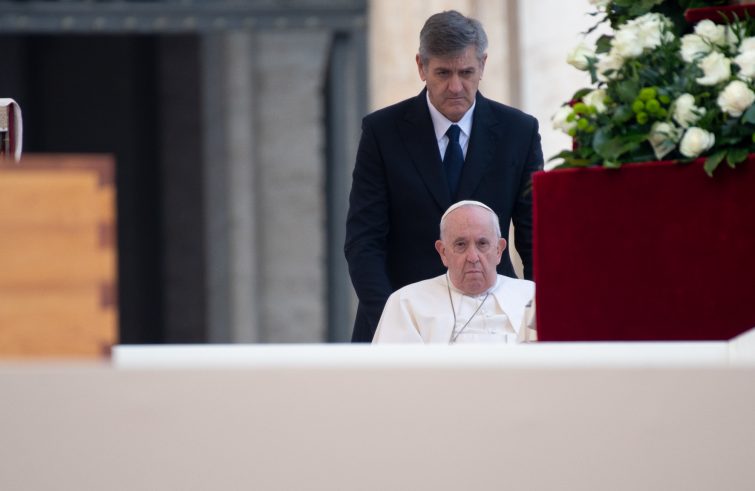
The Pope’s appeal “for an end to all wars in the world, and especially for the dear and martyred Ukraine” ended the Wednesday general audience, during which the Holy Father announced that he will write an apostolic letter on Saint Therese of the Child Jesus, marking the 150th anniversary of her birth. Indeed, it was precisely from the relics of St. Therese of Lisieux, purposely placed before the Pope on the parvis, where he laid a white rose, that the catechesis devoted to St. Therese, universal patroness of the missions although she was “never sent on a mission” – as Francis recalled -, began. The Pope thus went on to outline the main stages of her 24 year-long life.
After the general audience, Pope Francis was admitted to the Gemelli Hospital to undergo a laparotomy and abdominal wall plastic surgery with prosthesis, which was planned and became necessary to prevent an intestinal obstruction, the director of the Holy See Press Office, Matteo Bruni, told journalists.
This is the second surgical operation that Pope Francis will undergo, after the intestinal surgery of July 4, 2021, in the same hospital in Rome. Overall, this will be Pope Francis’ third hospitalisation at the Gemelli Hospital after those of 2021 – which lasted 10 days – and of March 29, 2023, which lasted three days (due to bronchitis). In this case, hospitalization is expected to last several days to allow for the normal post-operative care and complete recovery from surgery.”

“Though her body was sickly, her heart was vibrant, missionary.”
Her “missionary strength” and her “joy of interceding” are two distinctive traits of the spirituality of St. Thérèse of Lisieux, evidenced in two episodes that occurred before Thérèse entered the monastery, the Pope said in the weekly general audience. The first concerns “the day that changed her life”, Christmas 1886, when God worked a miracle in her heart. Shortly after that, Therese would turn 14 years old”, Francis said: “As the youngest child, she was pampered by everyone at home. Returning from midnight Mass, however, her very tired father did not feel like being there when his daughter opened her gifts, and said, ‘Good thing it’s the last year!’ Therese, who was very sensitive and easily moved to tears, was hurt, and went up to her room and cried. But she quickly suppressed her tears, went downstairs and, full of joy, she was the one who cheered her father.” “What had happened?”, the Pope asked: “On that night, when Jesus had made himself weak out of love, her soul became strong: in just a few moments, she had come out of the prison of her selfishness and self-pity; she began to feel that ‘charity entered her heart, with the need to forget herself.’ From then on, she directed her zeal toward others, that they might find God, and, instead of seeking consolations for herself, she set out to ‘console Jesus, make him loved by souls,’ because, as Therese, Doctor of the Church, noted, ‘Jesus is sick with love and […] the sickness of love cannot be cured except by love.’ This then was her daily resolution: to ‘make Jesus loved’, to intercede for others. She wrote, ‘I want to save souls and forget myself for them: I want to save them even after my death’. Several times she said, ‘I will spend my heaven doing good on earth.’ This is the first episode that changed her life when she was fourteen-years-old.”
“The missionaries of whom Theresa is patroness – the Pope remarked – are not only those who travel long distances, learn new languages, do good works, and are good at proclamation; no, a missionary is anyone who lives as an instrument of God’s love where they are. Missionaries are those who do everything so that, through their witness, their prayer, their intercession, Jesus might pass by.”
“This is the apostolic zeal that, let us always remember, never works by proselytism or constraint, but by attraction”, Francis pointed out: “one does not become a Christian because they are forced by someone, but because they have been touched by love.” The Pope thus mentioned the second decisive episode in the life of St. Theresa as an example of apostolic zeal: she interceded for the conversion of a criminal, Enrico Pranzini, sentenced to death and destined for the guillotine. Thanks to her prayers, just before laying his head on the block, “’all of a sudden, seized by a sudden inspiration, turned around, grabbed a Crucifix that the priest handed to him and kissed three times the sacred wounds’ of Jesus.” “Such is the power of intercession moved by charity; such is the engine of mission”, the Pope said. “With so many means, methods, and structures available, which sometimes distract from what is essential – Francis added – the Church needs hearts like Therese’s, hearts that draw people to love and bring people closer to God.” “Let us ask this saint for the grace to overcome our selfishness and for the passion to intercede that Jesus might be known and loved”, the final appeal.











